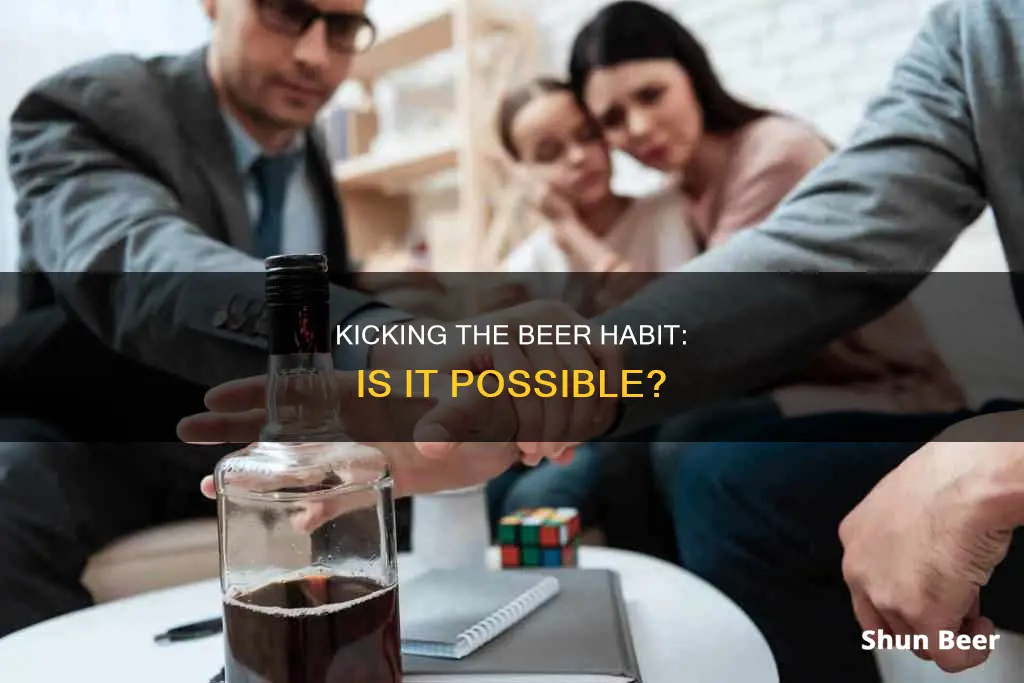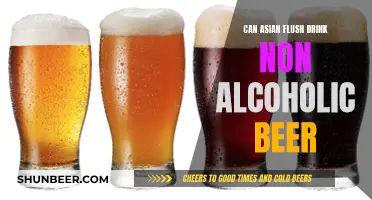
Drinking alcohol is a common pastime for many, but it can be difficult to know when it's time to cut back or stop drinking altogether. Excessive alcohol consumption can lead to health problems such as high blood pressure, heart disease, and stroke, and is associated with an increased risk of certain cancers. It can also affect your mental health, causing increased anxiety, depression, and irritability, as well as relationship issues. If you're concerned about your drinking, it's important to seek professional help and support. Giving up alcohol can bring several physical and mental health benefits, including improved sleep, weight loss, better heart health, and a reduced risk of cancer. It can also save you money and improve your relationships. However, quitting drinking can be challenging, and it's important to be persistent and seek support from friends, family, and healthcare professionals.
| Characteristics | Values |
|---|---|
| Reason for stopping | Lifestyle change, medical reasons, or as a challenge |
| Benefits | Improved sleep, more energy, weight loss, better skin, improved liver function, lower blood pressure, improved relationships, more money, improved mental health |
| Withdrawal symptoms | Shaking, sweating, nausea, irritability, poor concentration, difficulty sleeping, bad dreams, trembling hands, headache, palpitations, lack of appetite, convulsions, fever, hallucinations |
| Support | GP, national alcohol support services, counselling, local support groups, helplines |
What You'll Learn

Understand your relationship with drinking
Understanding your relationship with drinking is a crucial step in deciding to cut down or quit alcohol. Here are some ways to gain insight into your drinking habits and their impact on your life:
Examine the Health Effects of Alcohol
Alcohol can affect your health in numerous ways, even when consumed in moderate amounts. It can leave you feeling groggy, foggy, or hungover. Excessive drinking can lead to increased anxiety, depression, irritability, and conflict with loved ones. Additionally, alcohol is associated with a higher risk of cancer, heart disease, and stroke. Understanding the potential negative consequences of drinking is an important step in re-evaluating your relationship with alcohol.
Identify Your Reasons for Drinking
Understanding why you drink is essential. Are you drinking to cope with stress, to enhance social situations, or for enjoyment? Identifying your triggers and reasons for drinking can help you explore alternative ways to address these issues more productively. For example, if you drink to relieve stress, you could try affirmations, deep breathing, or meditation instead. Recognizing your triggers will enable you to plan ways to manage the urge to drink effectively.
Evaluate Your Drinking Habits
It's important to be honest with yourself about how much you drink. Even if you don't feel dependent on alcohol, you may still be drinking more than is recommended or what is healthy for you. Take an honest look at your drinking patterns and consider whether you tend to drink more than you intended or have difficulty stopping after one or two drinks. Understanding your drinking habits will help you set realistic goals and make informed choices about drinking.
Understand the Impact on Your Life
Consider how alcohol affects your life as a whole. Reflect on the role alcohol plays in your daily routine, social life, and relationships. Think about whether it interferes with your work, health, or personal goals. Ask yourself if your drinking has ever led to arguments or strained relationships. By understanding the broader impact of alcohol on your life, you can make more informed decisions about your drinking habits.
Seek Professional Support
If you feel that your drinking is becoming a problem or you're struggling to cut down, don't hesitate to reach out for professional support. Discuss your concerns with your healthcare provider or a therapist. They can provide guidance and help you develop a plan to reduce your alcohol consumption safely and effectively. Additionally, support groups, such as Alcoholics Anonymous or SMART Recovery, can offer additional resources and a community of people going through similar experiences.
Beer and Medication: Is it Safe to Drink with GL?
You may want to see also

Identify triggers and reasons for drinking
Identifying triggers and reasons for drinking is a crucial step in understanding your relationship with alcohol and making a change. Here are some common triggers and reasons for drinking that can help you plan ways to manage the urge to drink:
Stress and Emotional Baggage
Stress is one of the most common triggers for drinking. Drinking alcohol is often used as a coping mechanism to relax and forget about stressful situations temporarily. However, it's important to understand that alcohol doesn't improve stress; it only provides a temporary escape. To effectively manage stress triggers, it is crucial to practice stress-management techniques such as exercise, meditation, or deep breathing. Additionally, resolving any underlying emotional issues that trigger drinking can help reduce these cravings.
Social Situations and Peer Influence
Social situations and peer influence can be a significant trigger for drinking. Drinking alcohol in social settings is often associated with bonding, relaxation, and increased confidence. However, it's important to remember that alcohol doesn't make you more confident; it lowers your inhibitions. To manage this trigger, it may be helpful to bring a trusted sober companion to social events or join support groups with other sober individuals.
Routine and Habit
Habits and routines can also trigger drinking. For example, if you associate drinking with specific times of the day or passing by a bar on your way home, your brain immediately signals the urge to drink. To overcome this trigger, consider changing your routine or route to avoid these cues.
Self-Medication
Some individuals may use alcohol to self-medicate, especially if they struggle with sleep or chronic illnesses. They believe that alcohol helps quiet their mind and aids sleep. However, alcohol disrupts sleep quality, and there are healthier alternatives to manage sleep issues. Similarly, for those dealing with chronic illnesses or disabilities, alcohol may seem like a way to cope with flare-ups or forget about their condition temporarily. It is crucial to address the psychological elements of these drinking patterns and find alternative ways to manage pain and emotions.
Partner Influence
Your partner can also be a drinking trigger, especially if drinking together has become a cosy routine. It's essential to start mixing up your evening routines to prevent automatic drinking when your partner is around.
Misconceptions about Alcohol
Misconceptions about alcohol, such as believing that drinking is beneficial for your health or that you can control your drinking after a period of sobriety, can trigger relapses. It is important to understand that there is no safe amount of alcohol consumption, and even one drink can lead to a full-blown relapse.
Identifying your specific triggers and understanding your relationship with alcohol is essential for making a positive change. It empowers you to develop effective strategies to manage cravings and maintain sobriety.
Beer and Mushrooms: A Safe Mix?
You may want to see also

Change your environment
Changing your environment can be a powerful tool when trying to stop drinking beer. Here are some strategies to help you modify your surroundings and reduce triggers:
Remove Alcohol from Your Home
Having alcohol easily accessible can be tempting when trying to quit. By removing alcohol from your home, you create a physical and mental barrier that can deter you from drinking. The inconvenience of having to go out and purchase alcohol can give you the time and space to find healthier distractions and alternatives.
Find a Go-To Non-Alcoholic Drink
Choosing a replacement beverage can be a simple yet effective strategy to help you resist the urge to drink beer. Opt for water, flavored sodas, teas, or other non-alcoholic drinks to satisfy your thirst and provide a sense of comfort. Having a go-to drink can help you feel more in control and committed to your decision to stop drinking.
Keep Yourself Busy with Alternative Activities
Engaging in alternative activities, especially those that get you out of the house and moving, can be a powerful distraction from cravings. Try to identify the times of day when you typically crave a drink and plan alternative activities during those periods. For example, you could go for a walk, visit a museum, or meet a friend for a cup of coffee.
Develop Alternative Coping Mechanisms
If you find yourself drinking to calm anxiety or cope with loneliness, it's essential to develop healthier coping mechanisms. Instead of reaching for a beer, try practicing affirmations, deep breathing, or meditation to ease anxiety. Reach out to loved ones, connect socially, or engage in self-care activities like watching your favorite movie when feeling lonely.
Seek Out Supportive Environments
Surround yourself with supportive people and environments that encourage your decision to stop drinking. Bring a trusted friend or family member who can provide encouragement when attending events where alcohol is present. Consider joining support groups or reaching out to other sober individuals who can relate to your journey and provide valuable guidance and motivation.
Remember, changing your environment doesn't have to be overwhelming. Start small and make gradual changes that feel manageable for you. Even a few simple adjustments can make a significant difference in your journey towards reducing or quitting drinking beer.
Drinking Beer with CPAP: What You Need to Know
You may want to see also

Prepare for alcohol detox
If you're planning to detox from alcohol, it's important to be aware of the risks involved and to prepare carefully. Here are some steps to help you prepare for alcohol detox:
- Seek professional help: Alcohol detox can be dangerous and should not be attempted alone. Seek guidance from a medical professional or a rehab facility. They can provide you with the necessary support and treatment to ensure your safety and well-being throughout the process.
- Remove alcohol from your environment: Get rid of any alcohol in your home or places where you spend time. This will help reduce temptation and make it easier to resist cravings during the detox process.
- Clear your schedule: Detoxing from alcohol can be a challenging and time-consuming process. Take time off work and temporarily set aside other responsibilities to focus solely on your recovery. This will help minimise distractions and ensure you have the energy and attention needed for a successful detox.
- Get support: Inform your loved ones about your decision to detox. Their encouragement and support can be invaluable during this difficult time. Consider finding a friend or family member who can stay with you during the process and provide assistance if withdrawal symptoms become severe.
- Address work and family obligations: Be honest with your employer and take advantage of resources such as the Family and Medical Leave Act, which entitles you to up to 12 weeks of medical leave. If you have caregiving responsibilities, make arrangements for temporary care, such as a long-term caregiver or boarding facilities for pets.
- Tie up financial and legal loose ends: Ensure that your bills will be paid on time while you are away. Set up automatic payments or ask a trusted person to manage your finances. Contact your insurance carrier to understand your financial responsibilities during treatment, including copays, deductibles, and coinsurance.
- Prepare the essentials: Bring only the items that are necessary and approved by the treatment program. This will help minimise distractions and ensure your comfort during your stay.
- Focus on hydration and nutrition: Alcohol withdrawal can cause fatigue, anxiety, depression, loss of appetite, nausea, and vomiting. Stay hydrated by drinking plenty of water, juice, broth, ice pops, and gelatin. Eat regular, balanced meals with a variety of fruits, vegetables, whole grains, and lean protein sources.
- Take vitamins and minerals: Detoxing from alcohol can deplete your body of essential nutrients. Consider taking B vitamins, multivitamins, vitamin C, vitamin E, and calcium to support your body during this time.
- Manage expectations and boundaries with family: Discuss any concerns or boundaries that your family may have regarding your treatment. Address their comfort level with potential setbacks and your return home. This open communication will help create a safer and more supportive environment for everyone.
- Relax and reflect: Take time to relax and check in with yourself before beginning the detox process. Engage in activities that bring you comfort, such as walking, soaking in a warm bath, or watching your favourite show. Reflect on your decision to detox and your goals for the future. Writing in a journal or writing a letter to yourself or a loved one can be helpful.
Beer and Lifting Weights: A Healthy Balance?
You may want to see also

Seek support
Seeking support is an important step in helping you stop drinking beer. This can take many forms, from friends and family to therapy and support groups.
Friends and Family
Letting your loved ones know about your decision to stop drinking can be a great source of encouragement and support. They can provide motivation to stick to your decision and help keep you accountable. It can also encourage them to examine their drinking habits.
Therapy
If you are having difficulty sticking to your goal or want some extra guidance, consider reaching out to a healthcare professional or therapist. They can help you identify your reasons for drinking and explore alternative ways to address those issues.
Support Groups
It may also be worth checking out a 12-step programme in your area, such as Alcoholics Anonymous or SMART Recovery. Joining an online support group can also help you feel less alone and provide additional support.
Rehabilitation Programmes
If you are addicted to or dependent on alcohol, a rehabilitation programme can help you develop insight and awareness into the reasons why you drink and provide strategies to support your long-term recovery. These programmes are often residential and provide free aftercare to continue supporting you following treatment.
Detoxification Programmes
For those who are physically dependent on alcohol, a medically assisted detoxification programme is recommended. This will ensure you are surrounded by professionals who can provide the correct level of care and support during withdrawal, which can be dangerous if done alone.
Remember, there is no shame in asking for help, and seeking support can make a significant difference in your journey to stop drinking beer.
Fireball and Beer: A Safe Mix?
You may want to see also
Frequently asked questions
There are many benefits to giving up alcohol, including improved physical health, better mental health, and more financial freedom. Physically, you may experience improved sleep, lower blood pressure, weight loss, and better skin. Mentally, you may feel happier, more productive, and have improved relationships.
It's important to first understand your relationship with drinking and seek social support. Letting friends and family know about your decision can help keep you accountable. You should also remove alcohol from your home and find alternative drinks that you enjoy.
Withdrawal symptoms can range from mild to severe and may include anxiety, tremors, sweating, nausea, elevated blood pressure, gastrointestinal upset, and seizures. For those with severe alcohol dependence, medical attention may be required.
This will vary depending on the individual. Some people may experience withdrawal symptoms for a few days, while others may find they need a few weeks to a month before they start to feel the benefits of improved physical and mental health.







